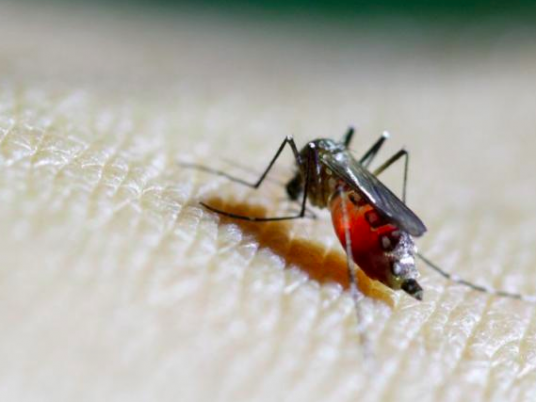
The Ministry of Health issued a statement about the situation of the Al-Aleqat village in Qena Governorate following the confirmed outbreak of dengue fever.
Laboratory results of blood samples drawn from suspected cases turned out positive for the disease.
The disease is under control and over 60 patients were analyzed, and water in the village is also being tested, Health Minister Khaled Abdel Ghaffar said in a statement.
In televised statements, the minister explained that this type of fever only needs painkillers and rest.
Mosquitos reproduce rapidly in the summer due to heat and water storage, and can transmit dengue fever from an infected person to another, said the Advisor to the President of the Republic for Health Affairs Mohamed Awad Tag Eddin.
In a statement, the ministry said that Health Ministry teams have been dispatched to the village of Al-Aleqat to follow up on the situation and carry out field investigations to compare suspected cases.
The team will conduct field investigations, take environmental samples, determine the possible cause of the disease, and take preventive measures, the statement added.
The Ministry of Health teams examined cases and took samples from those who that showed symptoms of disease, the statement explained, alongside taking environmental samples from water sources.
They also took samples from mosquitoes and mosquito larvae for examination at the central laboratories of the Ministry of Health and Population.
These results confirmed the presence of mosquitos transmitting the dengue fever.
The ministry said all infected cases were mild and received treatment at home, assuring that thus far no one has been hospitalized due to the outbreak.
Some cases were linked to others who showed symptoms in the cities of Safaga and al-Qusayr, the ministry added.
What is dengue fever?
According to the World Health Organization, dengue fever is a viral infection that is transmitted to humans bitten by infected mosquitoes.
According to WHO statistics, nearly half of the world’s population is at risk of contracting dengue fever, with an estimated 100 to 400 million infections annually.
What are the symptoms?
Most people infected with dengue display mild symptoms or no symptoms at all.
People with fever may improve within one or two weeks. In rare cases, dengue fever can be severe and cause death.
The WHO estimates that symptoms begin four to ten days after infection and last between two and seven days.
Symptoms may include high fever, headache, muscle and joint pain, nausea, vomiting, swollen glands, and rashes.
Severe dengue symptoms often appear after the fever has subsided and include abdominal pain, persistent vomiting, rapid breathing, bleeding from the gums or nose, fatigue, blood in vomit or stool and extreme thirst.
Is dengue fever transmitted from a pregnant mother to the fetus?
The main way humans contract dengue is from mosquitoes, but the WHO says mother-to-child transmission of the virus is possible though at a low risk.
Transmission appears to be related to the timing of dengue infection during pregnancy. If the mother is infected with dengue virus during pregnancy, her baby may be born prematurely and may have a low birth weight.
Treatment options
According to the Altibbi medical website, there is no specific treatment required for dengue fever as the disease fades on its own within several days and may continue for several weeks.
It may be necessary to use pain relievers and antipyretics, avoid medications that increase the risk of bleeding, as well as obtain adequate rest and keep hydrated.




